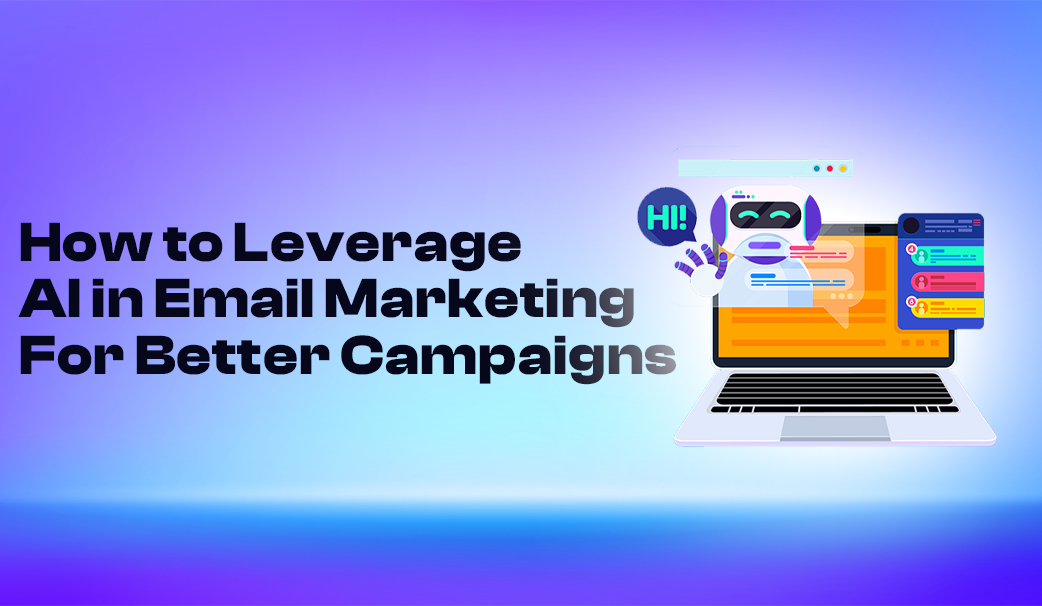
Today's busy digital life calls for unique and effective marketing campaigns. With a desire to influence the market, businesses work hard on automation in email marketing using Artificial Intelligence. With the power of Artificial Intelligence, it can now personalize with ease, get data analyses correctly, and achieve highly outstanding engagement rates. This blog explains how AI can be properly applied to email marketing, the benefits of the technology, and future possibilities.
AI helps marketers automate trivial tasks, provide hyper-personalized content, and predict customer behavior with unmatched accuracy. Businesses can thus tailor their messages to the preferences of the target audience and ensure that their emails are relevant to the recipient.
Key abilities of AI in email marketing include:
Content Personalization: AI algorithms do customer data analysis to produce emails personalized with subject lines, body text, and product suggestions.
Audience Segmentation: Advanced AI tools break up subscribers into different groups based on demographics, purchase history, and online behavior.
Predictive Analytics: AI predicts the actions of users, such as how likely a user is to open an email, click links, or make a purchase.
Performance Optimization: AI tools continuously analyze campaign performance to identify areas where improvement is needed.
AI enables businesses to produce targeted messages according to each customer's requirements and tastes. For example, AI may identify products a visitor has viewed or ordered previously, thus making it easier for him to convert.
AI guarantees that the message will be sent to the proper recipient at the proper time. This means that AI can be useful to enhance open rates, click-through rates, and overall engagement.
AI automates repetitive work, including writing email subject lines, segmentation, and determining sending time to avoid unnecessary effort in preparing emails. This reduces costs and time for the marketer, who then gets an opportunity to further develop a marketing strategy.
AI arms the marketer with actionable information stemming from vast amounts of data. Insights fine-tune strategies for improved effectiveness.
Free AI tools for email marketing make the integration of AI into the campaign easy. The AI functionalities of the tools include content recommendation, A/B testing, and analytics features of tools like Mailchimp, HubSpot, and Sender.
Personalized emails can boost the transaction rate by a number of times. Use AI in order to personalize subject lines, greetings, and content from emails according to subscriber data.
AI application scans recipient behavior to send emails at the right times. This reduces the tendency of unsubscribing by the recipients and increases the chances of engagement.
AI helps in smoothening the process of A/B testing by choosing which email version performs the best. It determines which subject line, images, or CTA buttons best suit the email campaign.
The continuous process of learning data makes AI confirm the real-time optimization of a campaign for email marketing. For this, the marketer has to keep track of performance metrics and devise fresh strategies as proposed by AI.
Though it has advantages, AI incorporation in email marketing poses several barriers:
AI is highly dependent on customer data, which raises a lot of issues about privacy and security. Businesses have to adhere to data protection regulations, such as GDPR and CCPA.
Setting up AI tools may require technical know-how and resources in existing marketing systems.
AI relies on the quality and accuracy of the data it works with. Businesses need good data management practices to attain the desired results.
AI and the future of email marketing The future looks bright and holds so much promise. Natural Language Processing, and, in particular, Machine Learning advancements will change business engagement and interaction with the audiences in many aspects. Some trends to follow include:
Hyper-Personalization: Through AI, hyper-personalization becomes more real through dynamic content being put inside emails with a timely touch for real-time personalizing of email communication.
Predictive Customer Journeys: AI will understand the needs of customers and facilitate journeys for them, thereby increasing conversion rates.
Voice and Visual Integration: Emails will eventually become more interactive with visual and voice-based elements, thus improving user experience.
More Advanced Automation Tools: AI-powered intuitive platforms will make automation accessible to businesses of all sizes.
AI has completely redefined the landscape of email marketing and given businesses unprecedented opportunities to improve their campaigns. With content personalization to predictive analytics, AI-powered tools help marketers get better engagement, save time, and make data-driven decisions. However, despite these challenges of data privacy and integration, the benefits are way above the obstacles. And so, with the further advancements in technology, the future of AI in email marketing is a goldmine of potential innovation and success.
How can AI help improve email marketing campaigns?
AI enhances email marketing by personalizing content and audience segmentation as well as prediction in analytics. It helps in making send times better, improving the engagement rate, and developing actionable insights for better decision-making.
How does AI help with marketing campaigns?
AI is used for data analysis of customers, to predict behavior, personalize content, and automate repetitive tasks. Its role is very significant in optimizing campaigns across different channels: email, social media, and search engines.
How will AI shape the future of email marketing?
Hyper-personalization, predictive customer journeys, and interactive visual and voice components represent the future of AI in email marketing. Email marketing is going to become even more efficient and impactful due to AI.
What are some free AI tools for email marketing?
Popular free AI tools for email marketing are Mailchimp, Sender, and HubSpot. Those tools provide functionalities like audience segmentation, A/B testing, and analytics.
How does email marketing automation benefit businesses?
Automation makes repetitive tasks easier and saves time and money. It lets the business focus on strategy while making sure that it's constantly communicating with its audience on a timely basis.
